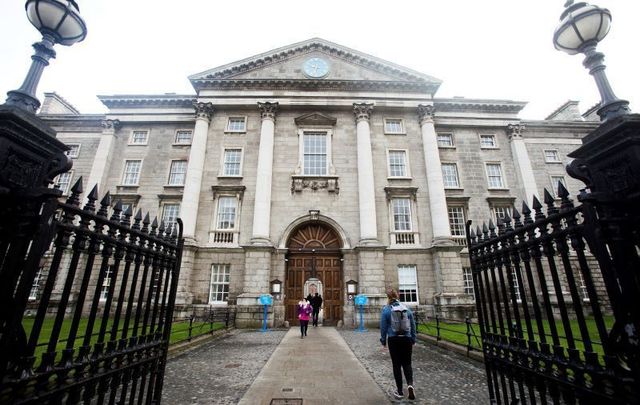'Rethinking Democracy - Marginalised Groups' is the second in a five-part series presented by Trinity College Dublin
Trinity College Dublin live streamed its workshop "Rethinking Democracy - Marginalised Groups" on Wednesday, May 6 from Trinity's Long Room Hub Facebook page. It was also be featured here on IrishCentral and our Facebook page:
Rethinking Democracy | MARGINALISED GROUPS‘While Covid-19 is a global threat, it is the most vulnerable who are most at risk.’ – President of Ireland, Michael D. Higgins With major outbreaks already seen in some of the biggest correctional facilities in the world, there is a very real danger that Covid-19 could be a death sentence for those within criminal justice systems. Prisons are not conducive to social distancing, exacerbated in some regions by existing issues of overcrowding, understaffing and poor hygiene. The mass surveillance of those on probation and parole is likewise problematic. Early release schemes and public policy are coming under increased scrutiny. As age is a major risk factor, the pandemic has also sparked debate as to whether older populations should be protected – 'cocooned' – or, in a more calculated economic move, sacrificed for the sake of their grandchildren. Thought to account for half of all deaths from the virus in Europe, care facilities are in a state of crisis while those isolating at home may face mental and physical deterioration. The living conditions of refugees, displaced populations, and homeless people likewise put these already vulnerable groups at higher risk of Covid-19 infection and complications. The second in a five-part series, this workshop will explore how Covid-19 is affecting those on the margins of society. Our speakers will discuss the pandemic in relation to criminal justice systems and examine issues concerning ageism, the care sector and economic policy. They will address the potential human rights implications and consider how the virus might be used as an opportunity to change attitudes, implement reform and build better, more inclusive societies.The floor will then be open for participants to respond: to ask questions and to widen the parameters of the conversation.
Publiée par Trinity Long Room Hub Arts and Humanities Research Institute sur Mercredi 6 mai 2020
Read More: WATCH: Trinity College live panel discussion on public health crises and democracy
'Marginalised Groups' will explore how Covid-19 is affecting those on the margins of society.
The discussion is a five-part 'Rethinking Democracy' series which is organized by the Trinity Long Room Hub Arts and Humanities Research Institute in partnership with the Society of Fellows and Heyman Center for the Humanities at Columbia University.
The conversations will build upon issues addressed in the free, online Crises of Democracy curriculum launched earlier this year. The curriculum, which includes videos, podcasts and readings, is the product of the Global Humanities Institute on the crises of democracy funded by the CHCI (Consortium of Humanities Centres and Institutes) and the A.W. Mellon Foundation. Both the Trinity Long Room Hub and the Heyman Centre were involved in this project with partners from Brazil, India, and Croatia.
Of the 'Marginalised Groups' discussion, organizers say: “With major outbreaks already seen in some of the biggest correctional facilities in the world, there is a very real danger that Covid-19 could be a death sentence for those within criminal justice systems. Prisons are not conducive to social distancing, exacerbated in some regions by existing issues of overcrowding, understaffing and poor hygiene. The mass surveillance of those on probation and parole is likewise problematic. Early release schemes and public policy are coming under increased scrutiny.
“As age is a major risk factor, the pandemic has also sparked debate as to whether older populations should be protected – 'cocooned' – or, in a more calculated economic move, sacrificed for the sake of their grandchildren. Thought to account for half of all deaths from the virus in Europe, care facilities are in a state of crisis while those isolating at home may face mental and physical deterioration. The living conditions of refugees, displaced populations, and homeless people likewise put these already vulnerable groups at higher risk of Covid-19 infection and complications.
“The second in a five-part “Rethinking Democracy” series, this workshop will explore how Covid-19 is affecting those on the margins of society. The speakers will discuss the pandemic in relation to criminal justice systems and examine issues concerning ageism, the care sector, and economic policy. They will address the potential human rights implications and consider how the virus might be used as an opportunity to change attitudes, implement reform, and build better, more inclusive societies. The floor will then be open for participants to respond: to ask questions and to widen the parameters of the conversation."
Read More: WATCH: Plagues and pandemics - Trinity experts on how history can help us battle Covid-19
Panelists
Rosemary Byrne is Professor of Legal Studies at NYUAD. She served as a Human Rights Commissioner for the Irish Human Rights Commission, which was established in the aftermath of the Good Friday Agreement, and was chair of the Scientific Committee of the EU Fundamental Rights Agency.
Rose Anne Kenny is the Chair of Medical Gerontology at Trinity College Dublin. She has just been awarded an Irish Research Council and Health Research Board grant to explore the impact of Covid-19 policies on mental and physical health of older adults. She is also the founder and director of MISA a large clinical research institute for ageing at St James Hospital in Dublin, and the founding Principal Investigator of The Irish LongituDinal study on Ageing (TILDA).
Vincent Schiraldi is a Senior Research Scientist at the Columbia School of Social Work and co-Director of the Columbia Justice Lab. He founded the Justice Policy Institute think tank and was formerly the Commissioner of the New York City Department of Probation and Senior Policy Adviser to the NYC Mayor's Office of Criminal Justice.
Read More: Discover The Book of Kells online through Trinity College Dublin's free course




Comments